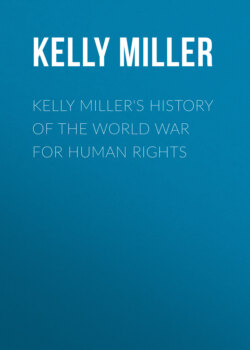Читать книгу Kelly Miller's History of the World War for Human Rights - Kelly Miller - Страница 172
На сайте Литреса книга снята с продажи.
BASE INDIGNITIES TO CLERGYMEN.
Оглавление"A group of 75 persons, among whom were several notables of the city, such as Father Coloboet and a Spanish priest, and also an American priest, were conducted, during the morning of Wednesday, August 26, to the square in front of the station. The men were brutally separated from their wives and children, after having received the most abominable treatment after repeated threats of being shot, and were driven in front of the German troops as far as the village of Campenhout. They were locked, during the night, in the church. The following day, at 4 o'clock, a German officer came to tell them that they might all confess themselves and that they would be shot half an hour later. When, finally, they were released, the report continues, they were recaptured by another German brigade and compelled to march to Malines, where they were finally liberated.
"An eye witness testified that he met nothing except burned villages, crazed peasants, lifting to each comer their arms, as mark of submission. From each house was hanging a white flag, even from those that had been set on fire, and rags of them were found hanging from the ruins. The fire began a little above the American College, and the city is entirely destroyed, with the exception of the town hall and the depot. Today the fire continues and the Germans, instead of trying to stop it—seem rather to maintain it by throwing straw into the flames, as I have myself seen behind the Hotel de Ville. The Cathedral and the theatre have been destroyed and fallen in, and also the library. The town resembles an old city in ruins, in the midst of which drunken soldiers are circulating, carrying around bottles of wine and liquor; the officers themselves being installed in arm chairs, sitting around tables and drinking like their own men.
"In the streets dead horses are decaying, horses which are completely inflated, and the smell of the fire and the decaying animals is such that it has followed me for a long time."
And the policy which developed such outrageous conduct on the part of the Kaiser's soldiers in the early days of the war, against which Belgium protested to the world, inspired brutal acts, ruthlessness and cruelty at every stage and during every period of the war. Nowhere is there written a single line which tells of the humanitarian acts of the German soldiers. Those who fight against them acknowledge their stoical bravery, the efficiency of the army, the navy and the people as a whole, but there is no reflection of refined instincts in any of the acts of Germany or the Germans.
